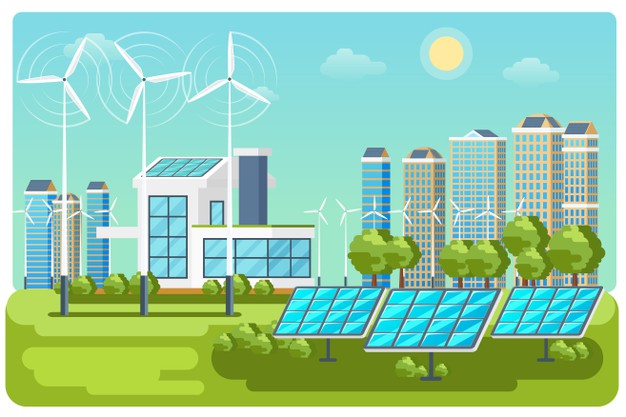They say, “Make hay while the sun shines.” And what better way to do it than making the best of freely available solar energy. Today, solar technology is gaining popularity for many reasons. Solar inverter price, cost of solar water heating and lighting systems, etc. are becoming more affordable. While availability and cost-efficiency are obvious benefits of choosing solar technology, it being a renewable and sustainable solution allows us to tackle several environmental challenges as well.
Here are some of the key advantages of choosing solar energy over non-renewable energy sources on the environment:
Improves Air Quality
Traditional sources of energy such as coal, oil, and natural gases produce carbon dioxide and other harmful emissions when burned. It leads to constant deterioration of the air quality. In fact, we unknowingly contribute to air pollution when we buy goods that use conventional energy sources for production.
Alternatively, using renewable energy sources such as solar can reduce the dependency on fossil fuels leading to significant improvement in air quality in the long run. Using solar panels to generate electricity does not affect the environment as they do not produce any harmful or toxic emissions.
Saves Water
Water is undeniably one of the most precious natural resources. However, human activities in the past few centuries have posed a threat to this once-abundant resource. Since water is used for many industrial purposes such as cooling generators, refining, and processing fuel, and in the fuel pipelines, its consumption has increased significantly in the past few decades.
Solar alternatives can address the above issue as they do not require water for operational purposes. The only water requirement for solar panels is for cleaning the dust and this can be met using rainwater too. Thus, switching to solar solutions would be a wise choice for sustainable development as well.
Reduces Strain on Resources
The exponential growth of the world population is putting additional pressure on available resources. Be it is water, land or services the demand is already exceeding the supply capacity. This trend is quite evident in the field of energy as well. Fossil fuels are not only non-renewable but are also unclean energy sources. Eventually, such resources will come to an end. On the contrary, solar solutions are dependent on the energy from the sun which is an abundant and renewable resource. Moreover, solar panels have low input requirements and maintenance overheads, making them a great alternative to non-renewable resources.
Fewer Health Issues
Consumption of fossil fuels has a direct impact on human health. The emissions from such resources are linked to health conditions such as asthma, pneumonia, bronchitis, anxiety, headache, heart attacks, and even cancer. Adopting solar alternatives can significantly reduce harmful emissions such as sulfur dioxide, nitrous oxide, and particulate matter. Thus, solar solutions can improve the overall health of the population, which also means better work productivity as fewer workdays will be lost in combating health-related issues.
Reduces Carbon Footprint
Using fossil fuels for grid energy systems contributes significantly to the carbon footprint. Carbon footprint refers to the release of greenhouse gases like carbon dioxide due to human activities. As mentioned earlier, fossil fuels actively contribute to environmental deterioration due to harmful emissions. Using solar energy instead of fossil fuels for grid-electricity generation can reduce a significant amount of carbon emission into the atmosphere. Thus, one can contribute to environmental causes by just switching to solar solutions. Plus, the financial and energy gains associated with solar alternatives only make it a better investment as well.
It is obvious that the future depends on renewable energy resources like solar. And now, solar solutions are gradually becoming affordable too. For example, the solar inverter price has reduced significantly in the past few years making it the best time to switch to a solar alternative. Widespread adoption of solar solutions will not only reduce one’s dependency on traditional energy sources but will also improve the overall health of the environment.
Follow Home Inside for more!




